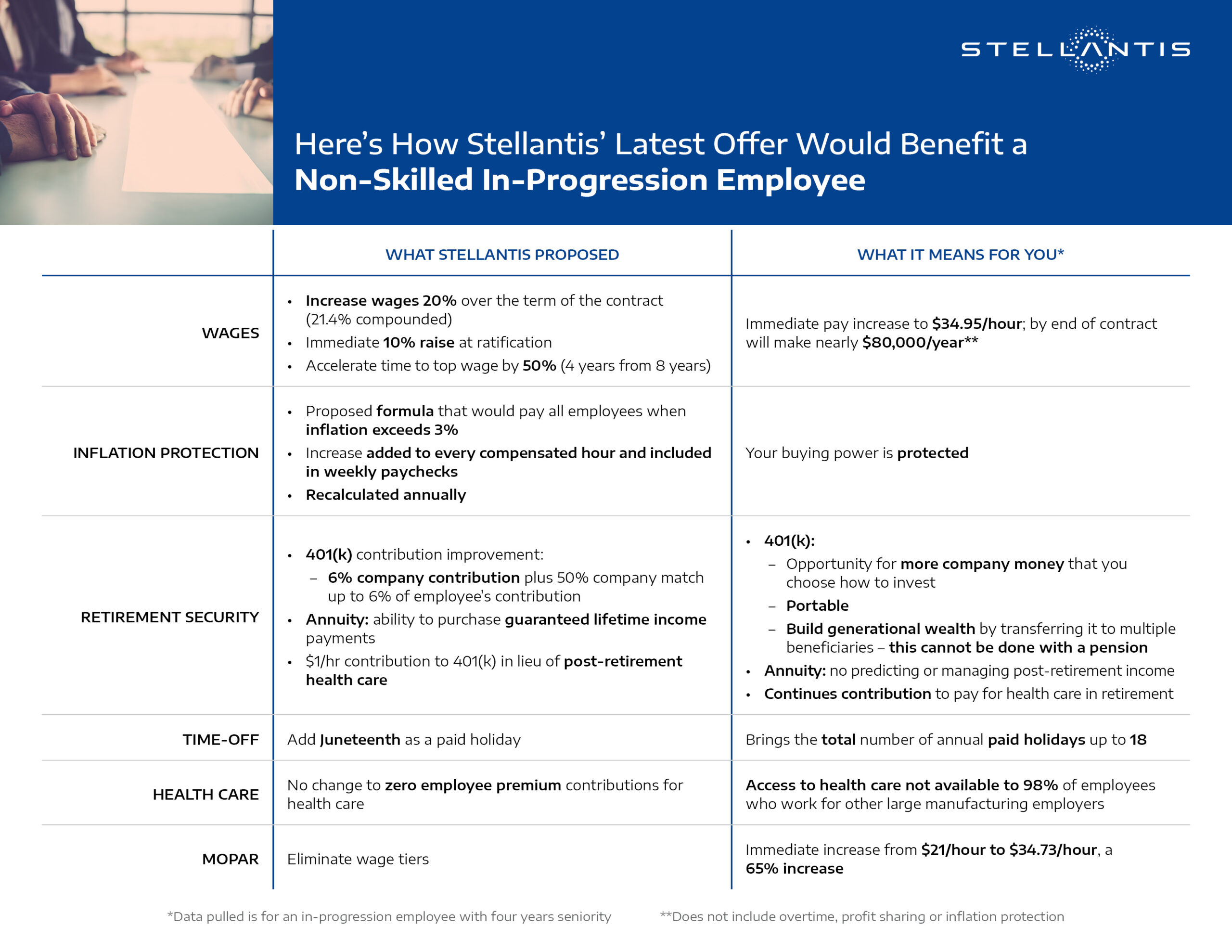Information Regarding the Negotiations
Labor Terms Glossary
Bargaining Unit
A group of workers who are represented by a union which bargains collectively with the employer on behalf of the employees it represents. The unit may include workers in a single location or in a number of locations. Whether the duties an employee performs are appropriately included in a particular bargaining unit is determined by the National Labor Relations Board or agreed to jointly by the union and the employer. A description of the Bargaining Units at FCA can be found in Schedule A in both the Production, Maintenance and Parts Agreement and the Engineering, Office and Clerical Agreement.
Base Rate
The straight time rate of pay, excluding premiums and incentive bonuses.
Collective Bargaining
A process in which workers, through their union representatives, negotiate as a group with their employer to determine wages, hours and other terms and conditions of employment. Normally, the result of collective bargaining is a written contract that covers all workers in the bargaining unit whether or not they are union members.
Duty of Fair Representation (DFR)
A union has a legal duty to represent all employees in bargaining unit positions, whether or not they are members of the union, fairly, in good faith and without discrimination. This duty applies to most actions that a union may take in dealing with an employer including collective bargaining and handling grievances. For example, the DFR may prohibit a union from refusing to process a grievance because an employee has criticized union officials.
Extension
Agreement between a union and an employer to extend a collective bargaining agreement beyond its expiration date. Typically, the parties extend bargaining agreements to continue negotiations in order to reach an agreement that is acceptable to both the employer and the employees who are represented by the union.
Good Faith Bargaining
A legal requirement for employers and unions involved in collective bargaining. The duty to bargain in good faith involves a variety of actions, including an agreement by the parties to meet and confer at reasonable times and places, and to give consideration and respond to proposals made by each other with the intention of reaching an agreement. The parties must respect the role of the other's representative by not seeking to bargain directly with those each party represents or engaging in any conduct that undermines the bargaining process or the authority of the other's representative. However, good faith bargaining does not require either party to accept the proposals of the other party.
Impasse
Under federal labor law, when unions and employers have used good faith efforts to reach an agreement to resolve a dispute over a mandatory subject of bargaining, but, after continuing to meet and confer in good faith, are under the honest belief that further bargaining would be futile, an impasse is likely has occurred. In collective bargaining, once the parties have bargained to an impasse, employers are legally permitted to unilaterally impose the last offer the employer has presented to the union.
Informational Picketing
A form of protest when people gather to publicize either the existence of a labor dispute or information concerning the dispute.
Injunction
A court order that imposes restraints or restrictions upon certain actions or directs that certain actions be taken. Parties that do not obey such orders may be held in contempt of court.
Lockout
A lockout is a denial of employment initiated by the management of a company during a labor dispute. A lockout is generally an attempt to enforce specific terms of employment upon a group of unionized employees or to force unionized workers to accept new terms and conditions of employment.
National Labor Relations Act of 1935 (NLRA)
In the United States, the NLRA gives private sector workers the legal right to organize and establish unions, to bargain collectively through chosen representatives and to participate in protected concerted activities for mutual aid or protection. It also provides that employees shall have the right to refrain from any or all such activities.
National Labor Relations Board (NLRB)
Agency created under the NLRA to, among other things, define appropriate bargaining units, hold and oversee elections, determine whether or not a majority of workers in the bargaining unit have elected to be represented by a union, certify unions to represent employees, interpret and apply the Act’s provisions prohibiting certain employer and union unfair practices and otherwise administer the provisions of the Act.
Ratification
Occurs when a union has reached a tentative bargaining agreement with an employer and union members are given the opportunity to vote to accept or reject the tentative agreement. If a majority of the union members vote in favor of the agreement, it is ratified.
Strike
Decision by a union to ask employees to stop reporting for work. Employees have a right to participate in a strike and not report to work or can elect to continue to work.
Strike Authorization Vote
A vote by the members of a union (often before bargaining is concluded) regarding whether the union should have the authority to call a strike, and if so, its duration.
Tentative Agreement (TA)
Agreement reached between an employer and a union that is subject to ratification by employees.
Working Without an Agreement
Occurs when a collective bargaining agreement expires, and although the parties have not agreed to an extension, employees continue to work under the terms of the expired agreement.
©2025 Stellantis Negotiations 2023 All Rights Reserved.
